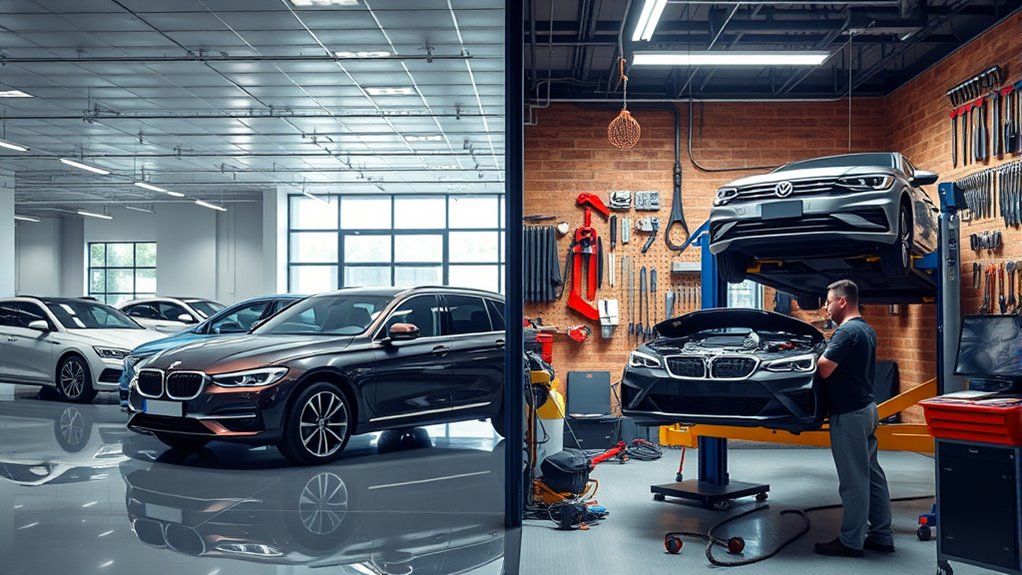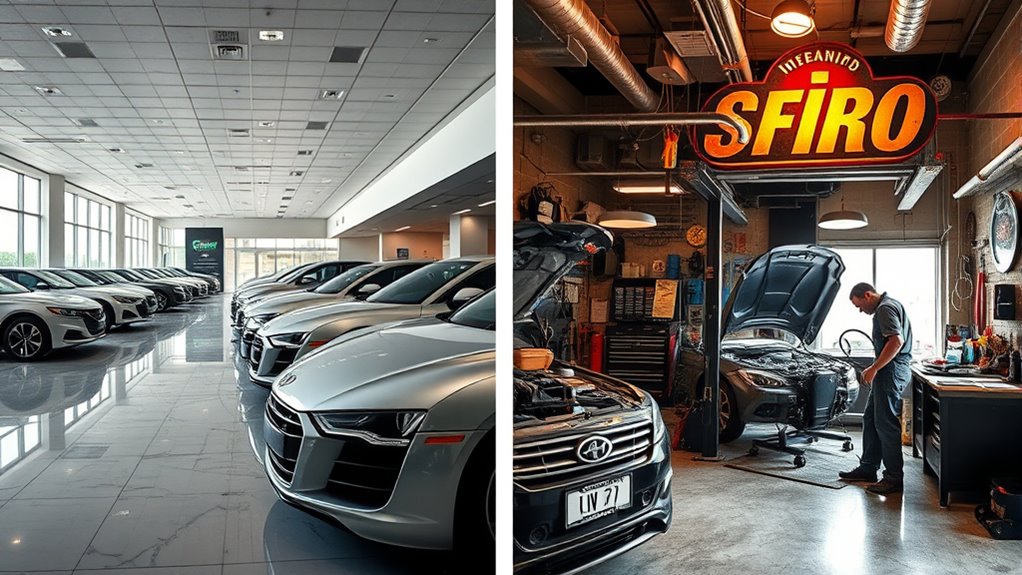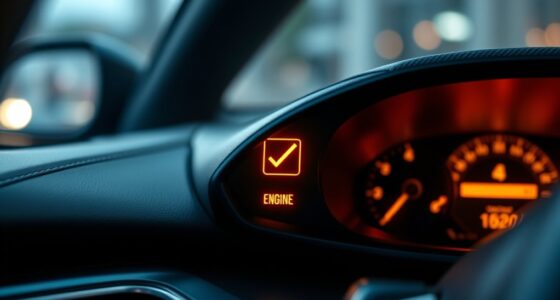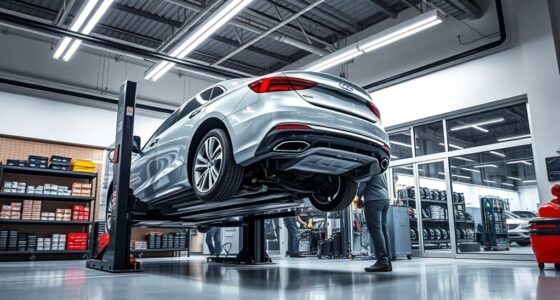If you’re prioritizing warranty coverage, manufacturer-specific knowledge, and easier warranty claims, a dealership is your best choice, as they have factory-trained technicians and access to OEM parts. However, if you want to save money and prefer personalized service, an independent mechanic might suit you better; just guarantee they have good reviews and clarify their policies beforehand. To understand the key differences and help make an informed decision, keep exploring these options further.
Key Takeaways
- Dealerships are ideal for warranty coverage, manufacturer-specific repairs, and access to official parts and updates.
- Independent mechanics often offer lower prices and personalized service, making them a cost-effective option.
- Dealerships provide transparent pricing and can handle warranty claims directly, simplifying the process.
- Independent shops may lack access to manufacturer-specific parts and technical bulletins, potentially affecting repair quality.
- Choose a dealership for warranty and manufacturer expertise; opt for an independent for cost savings and flexible service.

Are you trying to decide between taking your car to a dealership or an independent mechanic? It’s a common dilemma, and your choice can profoundly impact your experience, costs, and peace of mind. One of the first things to consider is warranty coverage. When you go to a dealership, you often get the advantage of factory-trained technicians working with manufacturer-specific parts. This means your warranty remains intact if repairs or services are needed within the coverage period. Dealerships are typically well-versed in the latest updates and recalls, making them a safe choice if your vehicle is still under warranty. They can handle warranty claims directly, saving you time and potential hassles. On the other hand, independent mechanics may not always have access to the same manufacturer-specific parts or knowledge, but many are highly skilled and can perform repairs effectively. Some independents may even offer extended warranty options or work with third-party warranties, but it’s vital to check their policies beforehand. Additionally, understanding relationships with suppliers can influence the availability of parts and service quality at both types of repair shops.
Pricing transparency is another essential factor. Dealerships often have set prices for services, which can make budgeting easier, but they might also be more expensive overall. Due to their brand association and overhead costs, dealerships sometimes charge higher labor rates and parts prices. However, they tend to be upfront about costs and can provide detailed estimates before starting work. Independent mechanics, in contrast, may offer more flexible pricing and sometimes better deals. Since they usually have lower overhead, they might be able to provide quality repairs at a reduced cost. Yet, pricing transparency can vary widely among independents; some might not give detailed estimates upfront or could have hidden fees. It’s wise to ask for an estimate before any work begins and compare it with other shops.
In essence, if you value warranty coverage and the peace of mind that comes with factory-trained technicians, going to a dealership might be your best bet. But if you’re looking for potentially lower prices and personalized service, an independent mechanic could be a better fit. Whichever route you choose, do your homework: read reviews, ask questions, and guarantee clear communication about costs and warranty policies. This way, you stay in control of your car’s maintenance and guarantee it gets the quality service it deserves.
Frequently Asked Questions
Do Independent Mechanics Offer the Same Warranty Coverage as Dealerships?
You might wonder if independent mechanics offer the same warranty coverage as dealerships. While independent shops can provide solid warranty coverage, it often varies based on their certification standards and parts used. Dealerships usually offer manufacturer-backed warranties, ensuring consistent standards. However, some independent mechanics are certified and may offer comparable warranties. Always ask about warranty coverage and certification standards before choosing a mechanic, so you know your car’s service is protected.
How Does Pricing Typically Compare Between Dealerships and Independent Mechanics?
You might think dealerships always cost more, but pricing transparency varies. Independent mechanics often offer lower rates with less overhead, making them a budget-friendly choice. However, cost variability exists depending on the repair complexity and parts used. Dealerships might charge more upfront, but sometimes include better warranties. Comparing quotes from both can help you find the best balance between affordability and quality, ensuring you get the best value for your money.
Are Independent Mechanics Qualified to Work on Brand-Specific Vehicles?
You might wonder if independent mechanics can handle your brand-specific vehicle. The good news is, many independent mechanics have brand-specific expertise and hold specialized certifications, proving their skills. While they may not have the official dealership tools or direct manufacturer training, reputable independents often provide quality service. Just verify they’re certified and experienced with your vehicle’s make, so you get expert care without the dealership price tag.
Can I Trust Independent Mechanics With Complex or New Technology?
You can trust independent mechanics with complex or new technology if they have proper technician training and access to advanced diagnostic equipment. Many skilled independents stay current with industry updates and invest in the latest tools. However, it’s wise to ask about their experience with your car’s make and model and guarantee they use quality parts. A reputable independent can often handle sophisticated repairs just as well as a dealership.
How Do Service Turnaround Times Generally Differ Between Dealerships and Independents?
You might notice that service appointment scheduling at dealerships often takes longer due to their structured processes, but they usually provide more precise repair time estimates. Independent mechanics typically offer quicker turnaround times because they have fewer bureaucratic steps, allowing for more flexible scheduling. However, the actual repair time can depend on the complexity of the issue and the mechanic’s workload, so always ask for an estimate upfront.
Conclusion
Choosing between a dealership and an independent mechanic can feel intimidating, but remember, quality service isn’t limited to one option. Even if you worry about cost, skilled independent mechanics often offer comparable expertise at a lower price. Trust your instincts, ask questions, and consider your car’s needs. Ultimately, you’ll find a mechanic who treats your vehicle like it’s their own, giving you peace of mind and reliable performance—no matter where you choose to go.









